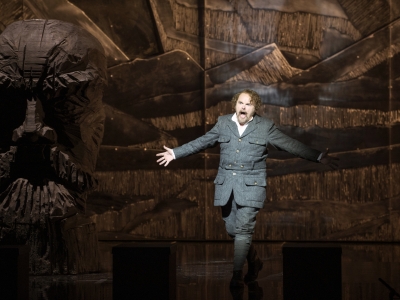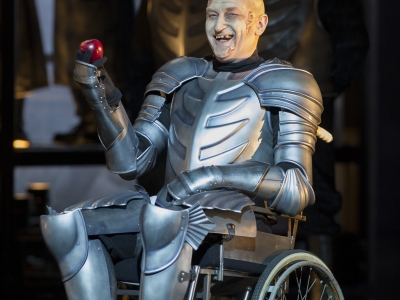

William Tell Rossini
Archived: 2014/2015Overview
Though better known for his comedies, Rossini reveals the more serious side of his character with a story that twists, turns and plays with our emotions.
What do you know about William Tell? Everyone knows the infectious tune used as the Lone Ranger theme. Everyone (probably) knows of the iconic scene in which Tell, fighting against Austrian oppression, shoots an apple on his son’s head. But there is much more to this opera than any of this suggests. If you’re looking for a night of inspiring heroism, a poignant story on an epic scale, uplifting music, spectacular sets and stunning costumes, you’ll find that William Tell hits the target with masterly precision.
Rossini’s last opera brings together the ever topical subject of foreign occupation, as stark and oppressive as a jagged Alpine peak, with sublime moments of uplifting hope and serenity. This production will see Swiss traditional folk costumes set against stiff, grey Austrian uniforms. The beautifully choreographed ballet sequences add to the contrast.
Our hero stands against this brooding and captivating landscape. The focus of his nation’s irrepressible aspiration, William Tell underlines how a nation once emboldened and aroused, like the natural world, will inevitably triumph. All it takes is a moment.
Co-production with Grand Théâtre de Genève and Teatr Wielki, Warsaw.




Good to know
Sung in French with surtitles in English (and Welsh in Cardiff and Llandudno)
Synopsis
Act One
While the peasants are celebrating the Shepherds’ Festival at the water’s edge, skilled archer and boatman William Tell stands apart, preoccupied with sorrow over his native Switzerland’s continued oppression by Austria. According to Swiss tradition, Melcthal, their leader, blesses all the loving couples, but leaves angrily after chiding his son, Arnold, for his failure to find a wife. Arnold then reveals his dilemma: he is in love with Mathilde - the sister of the brutal Austrian Governor, Gessler - but is torn by his loyalty to his country. He leaves in despair, and Tell’s son, Jemmy, triumphs in an archery contest, showing that he has inherited his father’s skill. The festivities are interrupted by the sudden entrance of Leuthald, a shepherd who has just killed an Austrian soldier to protect the honour of his daughter. Tell helps Leuthald escape Gessler’s troops by taking him across the treacherous rapids in his boat, but when the Austrian soldiers arrive, and the villagers refuse to implicate Tell, the Austrian commander, Rudolphe, seizes Melcthal and takes him prisoner.
Act Two
Arnold and Mathilde meet and swear their love for one another despite the obstacles in their path. Seeing Tell approach, Mathilde leaves, and Tell questions Arnold’s traitorous attachment to Mathilde. Arnold responds by declaring that he will fight for the Austrians, but when Tell reveals that they have executed his father, Arnold swears to avenge him. Tell, Arnold, and fellow Swiss patriot Walter vow to fight for independence, and they are joined by troops who will fight to liberate their nation from oppression.
Act Three
Arnold tells Mathilde that her brother was responsible for his father’s execution, and that he has chosen to stay in order to take vengeance. She sorrowfully concedes that their love is doomed. In Altdorf market place, Gessler presides over celebrations for the centenary of the Austrian rule over Switzerland. He places his hat atop a pole, and orders the Swiss civilians to bow before it as a symbol of the Austrian Emperor’s supremacy. William Tell refuses to obey, and is punished for this, as well as his role in aiding the escape of the fugitive Leuthald. Gessler orders Tell to take his bow and arrow and shoot an apple balanced on Jemmy’s head. Tell takes two arrows, but succeeds on the first shot, to the delight of his fellow countrymen, and to Gessler’s rage. When Gessler asks what he had intended the second arrow for, Tell replies that he had intended to kill the Governor if his first shot had wounded his son. Gessler orders the execution of Tell and his son, but Mathilde implores her brother not to murder a child. Despite the impending storm, Gessler announces that he will imprison Tell in Altdorf Castle, and then force him to navigate his boat across the dangerous waters to the Kusnac Fort, from where he will be thrown into the watery depths.
Act Four
Arnold is still set on his path of vengeance against Gessler, and persuades his fellow men to join him in his mission to rescue Tell. Tell’s distraught wife, Hedwige, is joined by Mathilde, and they resolve, alongside the other women, to storm the castle where Guillaume is imprisoned. Tell’s son Jemmy then reveals that Tell is on the boat that is bound for Kusnac, but a storm is raging on the Lake. Hedwige is grief-stricken, and starts to mourn her husband, but then the vessel comes into view, having been diverted from its course by the high winds. Tell, who has been released from his chains in order to guide the boat away from the rocks, arrives safely ashore. He sees that his house has been set on fire as a sign that the time for the rebellion has come, and as soon as Gessler appears, he shoots him with his bow and arrow. The villagers remain anxious that the Castle at Altdorf is still in Austrian hands, but Arnold arrives with his countrymen, declaring that they have taken the Castle. Mathilde swears allegiance to the Swiss cause, and as the storm finally calms, the Swiss patriots join together in celebration of the beauty of nature and the triumph of liberty.



